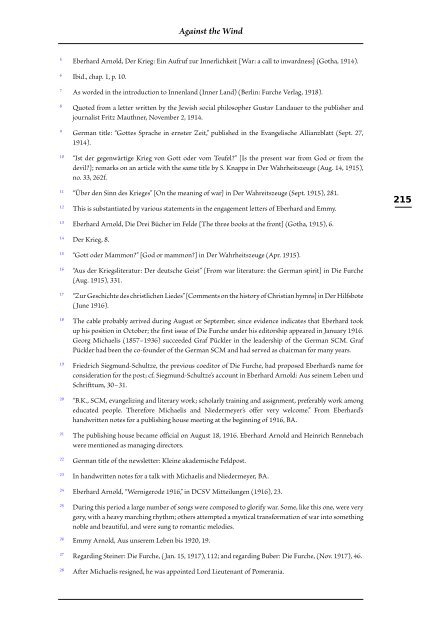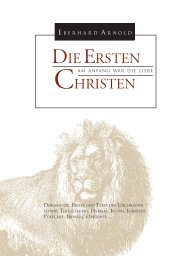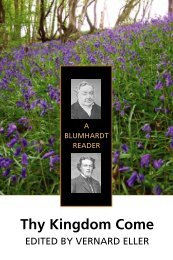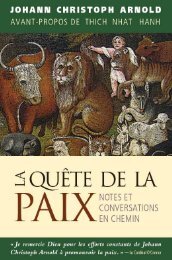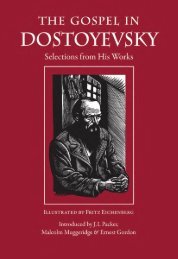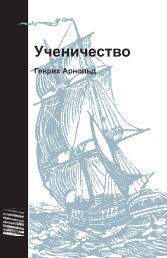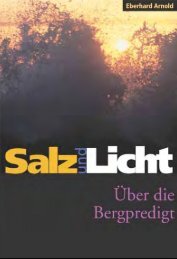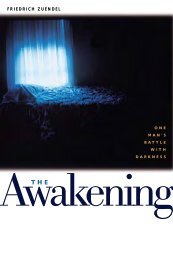Against the Wind: Eberhard Arnold and the Bruderhof - Plough
Against the Wind: Eberhard Arnold and the Bruderhof - Plough
Against the Wind: Eberhard Arnold and the Bruderhof - Plough
You also want an ePaper? Increase the reach of your titles
YUMPU automatically turns print PDFs into web optimized ePapers that Google loves.
<strong>Against</strong> <strong>the</strong> <strong>Wind</strong>5<strong>Eberhard</strong> <strong>Arnold</strong>, Der Krieg: Ein Aufruf zur Innerlichkeit [War: a call to inwardness] (Gotha, 1914).6Ibid., chap. 1, p. 10.7As worded in <strong>the</strong> introduction to Innenl<strong>and</strong> (Inner L<strong>and</strong>) (Berlin: Furche Verlag, 1918).8Quoted from a letter written by <strong>the</strong> Jewish social philosopher Gustav L<strong>and</strong>auer to <strong>the</strong> publisher <strong>and</strong>journalist Fritz Mauthner, November 2, 1914.9German title: “Gottes Sprache in ernster Zeit,” published in <strong>the</strong> Evangelische Allianzblatt (Sept. 27,1914).10“Ist der gegenwärtige Krieg von Gott oder vom Teufel?” [Is <strong>the</strong> present war from God or from <strong>the</strong>devil?]; remarks on an article with <strong>the</strong> same title by S. Knappe in Der Wahrheitszeuge (Aug. 14, 1915),no. 33, 262f.1112“Über den Sinn des Krieges” [On <strong>the</strong> meaning of war] in Der Wahreitszeuge (Sept. 1915), 281.This is substantiated by various statements in <strong>the</strong> engagement letters of <strong>Eberhard</strong> <strong>and</strong> Emmy.21513<strong>Eberhard</strong> <strong>Arnold</strong>, Die Drei Bücher im Felde [The three books at <strong>the</strong> front] (Gotha, 1915), 6.14Der Krieg, 8.15“Gott oder Mammon?” [God or mammon?] in Der Wahrheitszeuge (Apr. 1915).16“Aus der Kriegsliteratur: Der deutsche Geist” [From war literature: <strong>the</strong> German spirit] in Die Furche(Aug. 1915), 331.17“Zur Geschichte des christlichen Liedes” [Comments on <strong>the</strong> history of Christian hymns] in Der Hilfsbote( June 1916).18The cable probably arrived during August or September, since evidence indicates that <strong>Eberhard</strong> tookup his position in October; <strong>the</strong> first issue of Die Furche under his editorship appeared in January 1916.Georg Michaelis (1857–1936) succeeded Graf Pückler in <strong>the</strong> leadership of <strong>the</strong> German SCM. GrafPückler had been <strong>the</strong> co-founder of <strong>the</strong> German SCM <strong>and</strong> had served as chairman for many years.19Friedrich Siegmund-Schultze, <strong>the</strong> previous coeditor of Die Furche, had proposed <strong>Eberhard</strong>’s name forconsideration for <strong>the</strong> post; cf. Siegmund-Schultze’s account in <strong>Eberhard</strong> <strong>Arnold</strong>: Aus seinem Leben undSchrifttum, 30–31.20“B.K., SCM, evangelizing <strong>and</strong> literary work; scholarly training <strong>and</strong> assignment, preferably work amongeducated people. Therefore Michaelis <strong>and</strong> Niedermeyer’s offer very welcome.” From <strong>Eberhard</strong>’sh<strong>and</strong>written notes for a publishing house meeting at <strong>the</strong> beginning of 1916, BA.21The publishing house became official on August 18, 1916. <strong>Eberhard</strong> <strong>Arnold</strong> <strong>and</strong> Heinrich Rennebachwere mentioned as managing directors.22German title of <strong>the</strong> newsletter: Kleine akademische Feldpost.23In h<strong>and</strong>written notes for a talk with Michaelis <strong>and</strong> Niedermeyer, BA.24<strong>Eberhard</strong> <strong>Arnold</strong>, “Wernigerode 1916,” in DCSV Mitteilungen (1916), 23.25During this period a large number of songs were composed to glorify war. Some, like this one, were verygory, with a heavy marching rhythm; o<strong>the</strong>rs attempted a mystical transformation of war into somethingnoble <strong>and</strong> beautiful, <strong>and</strong> were sung to romantic melodies.26Emmy <strong>Arnold</strong>, Aus unserem Leben bis 1920, 19.27Regarding Steiner: Die Furche, ( Jan. 15, 1917), 112; <strong>and</strong> regarding Buber: Die Furche, (Nov. 1917), 46.28After Michaelis resigned, he was appointed Lord Lieutenant of Pomerania.


